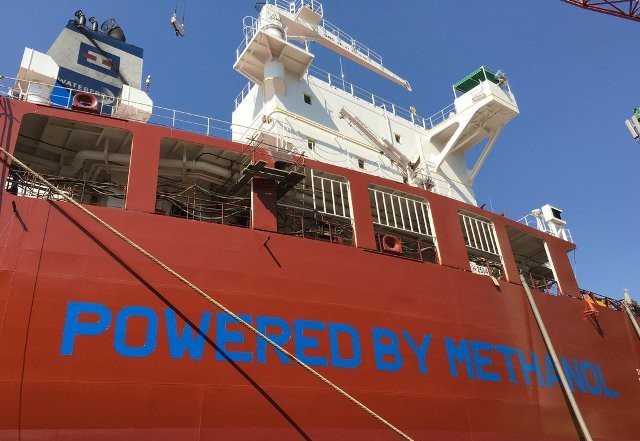
Methanol-burning vessels take to seas, aim to rein in marine shipping emissions
by Cleantech Canada Staff

Ships use innovative new engine capable of burning range of different fuels

Methanex subsidiary Waterfront Shipping Company Ltd. will begin operating seven alternative fuel-burning ships this year. PHOTO: Methanex, via Twitter
VANCOUVER—A new fleet of alternative fuel-burning ocean vessels is poised to make the marine shipping industry a little cleaner.
Vancouver-based Waterfront Shipping Company Ltd. (WFS) has announced the first of seven new 50,000 dead weight tonne ships, with engines capable of running on methanol, fuel oil, marine diesel oil, or gas oil, will take to the high seas this month.
“Working with our partners to advance new, clean technology is an important and innovative step in the right direction,” Jone Hognestad, WFS’s president, said.
Hognestad added that methanol-based marine fuel is not only more environmentally friendly than traditional fuels, but is an economically viable choice.
A subsidiary of the world’s largest methanol producer, Methanex Corp., the marine transport company will use the tankers to move bulk chemicals and petroleum products around the world. Three of the vessels will be leased from Mitsui O.S.K. Lines Ltd., two from Westfal-Larsen Management, while the remaining two are owned jointly by WFS and Marinvest/Skagerack Invest.
The bulk carriers are outfitted with new MAN Diesel & Turbo B&W ME-LGI 2-stroke dual fuel engines, capable of burning methanol, among other fuels, which allows operators to hedge against fuel price changes by burning different fuels when costs change.
While the rise of ethanol has hampered methanol’s use as an alternative fuel in recent years, particularly within the U.S., proponents of the technology say the fuel’s lower production cost offers companies a cheaper way to meet emissions regulations. In terms of emissions, methanol fuel significantly reduces sulphur oxide and nitrogen oxide emissions compared to traditional fuel.
Three of the seven ships are scheduled to be delivered this month, while the remaining four will be ready to take to the seas by October.